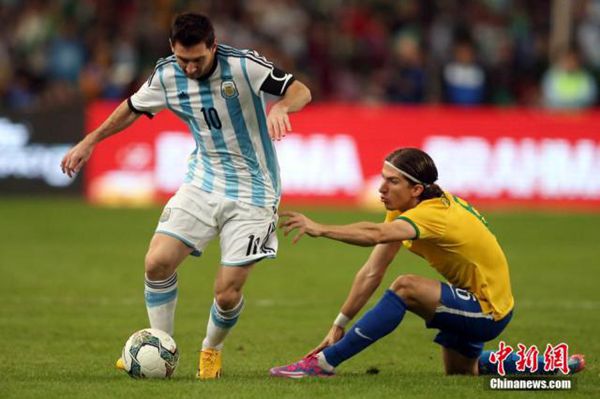Sports industry racing to open up
 0 Comment(s)
0 Comment(s) Print
Print E-mail China Daily, July 10, 2015
E-mail China Daily, July 10, 2015
|
|
|
Brasil and Argentina played an exhibition game at the National Stadium in Beijing last November. |
It's 11 pm on Friday night and the hot scenes at Now Fitness, Beijing's first 24-hour gym in eastern downtown, are pumping adrenaline high enough for another workout session.
The noises of weight plates tapping each other, dumbbells hitting the ground and treadmills running fast mixed with deep breaths and groans sound like a wake-up call for gym members like Lin Peng, a white-collar employee who lives nearby.
"I like the electrifying atmosphere here. It's late at night but the energy doesn't stop at all. Working out at night helps us shake off the mental stress from during the day," said Lin, who has signed up for a one-year membership at Now Fitness.
"It's really convenient to have a gym running 24 hours at your doorstep so you can make use of your spare time even late at night, that's why I think a lot of people love it here," he added.
Inspired by the concept of the 24-hour operations of US-based franchise Anytime Fitness, veteran fitness trainer Yang Bin started his own business by opening Now Fitness in January. He said he has high expectations of taking advantage of the fast-growing public enthusiasm for keeping fit and healthy.
"The passion for fitness has been roaring among urban residents, but a lot of people just don't have time for a workout during the daytime, even at weekends. So why not pull pieces of time together and make full use of it at night?" said Yang, who started his career as a fitness trainer in 2003.
Six months on, Now Fitness has attracted 500 members with eight employees including four trainers, and has managed to break even despite operational costs of more than 1 million yuan ($160,000).
"The growing market has provided untapped potential for privately owned businesses to net gains in the sports industry," said Yang, who is preparing to open another gym branch in the northeastern downtown area.
The boom in the fitness industry underscores how spending on sporting events and fitness-related activities has soared against a backdrop of urban consumption that has rapidly shifted toward leisure and recreation in recent years.
With a growing number of domestic and international sporting events held annually, related businesses, including club merchandizing, onsite catering, sales of sporting goods and trading in media rights, have been booming, contributing an increasing amount to the turnover of the country's fledgling sports industry.
According to research by Tan Jianxiang, a professor of sports sociology at South China Normal University, the added value of the sports industry reached 340 billion yuan in 2013 and has seen an average annual growth of 13.4 percent since 2008.
"Compared with the flat overall economic growth, the sports industry has grown rapidly over the years. The consumption of intangible products, such as professional league games, fitness guidance and services, has been an increasingly important driver of the growth," said Tan, a member of the State Council's think tank on sports policy.
Official backing
As China aims to shift its sporting focus from elite gold-medal-winning athletes to improving general levels of public fitness and well-being after the 2008 Beijing Olympics, boosting the sporting sector has become a top priority for the central government.
In October, the State Council, China's Cabinet, issued a national development plan for the sports industry, urging the General Administration of Sport of China, the governing body, to loosen its tight grip on the untapped market and allow a larger number of businesses and private investors to enter the industry long dominated by State-owned companies. The policy has been ratified, but has not yet been fully implemented.
It's no surprise that so many players are reaching for a slice of the cake-China's sporting industry is expected to be worth more than 5 trillion yuan by 2025, when it's likely to account for about 1 percent of GDP compared with 0.6 percent in 2012, according to State Council projections.
Under the plan, the national sports administration and its branch administrative centers would relinquish the approval and oversight rights for commercial and mass sporting events to "unburden enterprises to the utmost and give vitality to all kinds of sporting resources", according to a statement released by the State Council.
Currently, all sporting events must be approved by the GASC, which also charges administration fees based on the scale and commercial prospects of the event concerned.
The proposed changes were welcomed by Chinese sporting luminaries, including former NBA star Yao Ming, a member of the Chinese People's Political Consultative Conference, who last year submitted a similar proposal to the nation's top political advisory body.
"The government decision (to free-up the sports market) provides a strong push to start the wheels of the sports industry rolling," said Yao, who owns the Shanghai Sharks CBA team.







Go to Forum >>0 Comment(s)